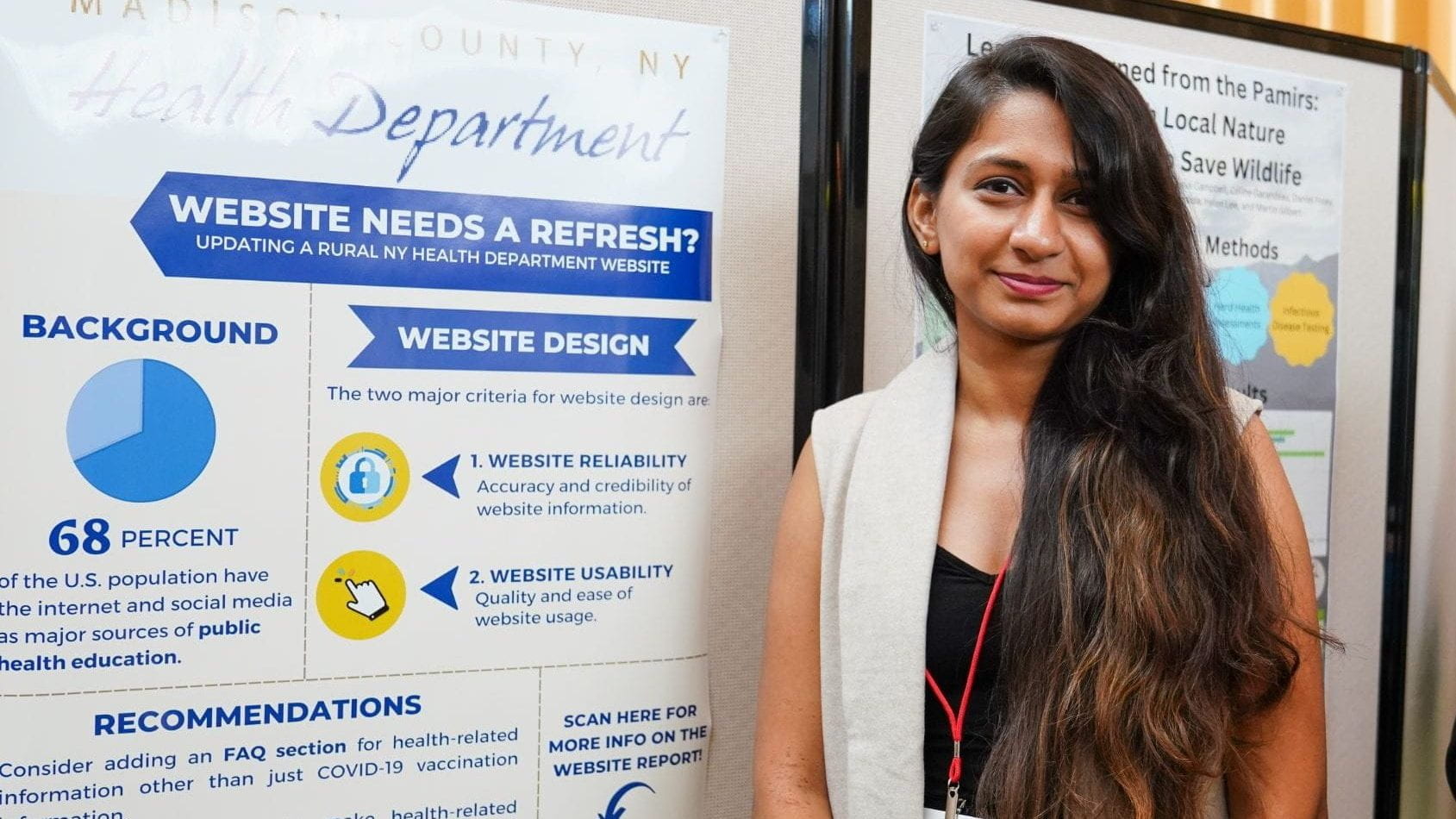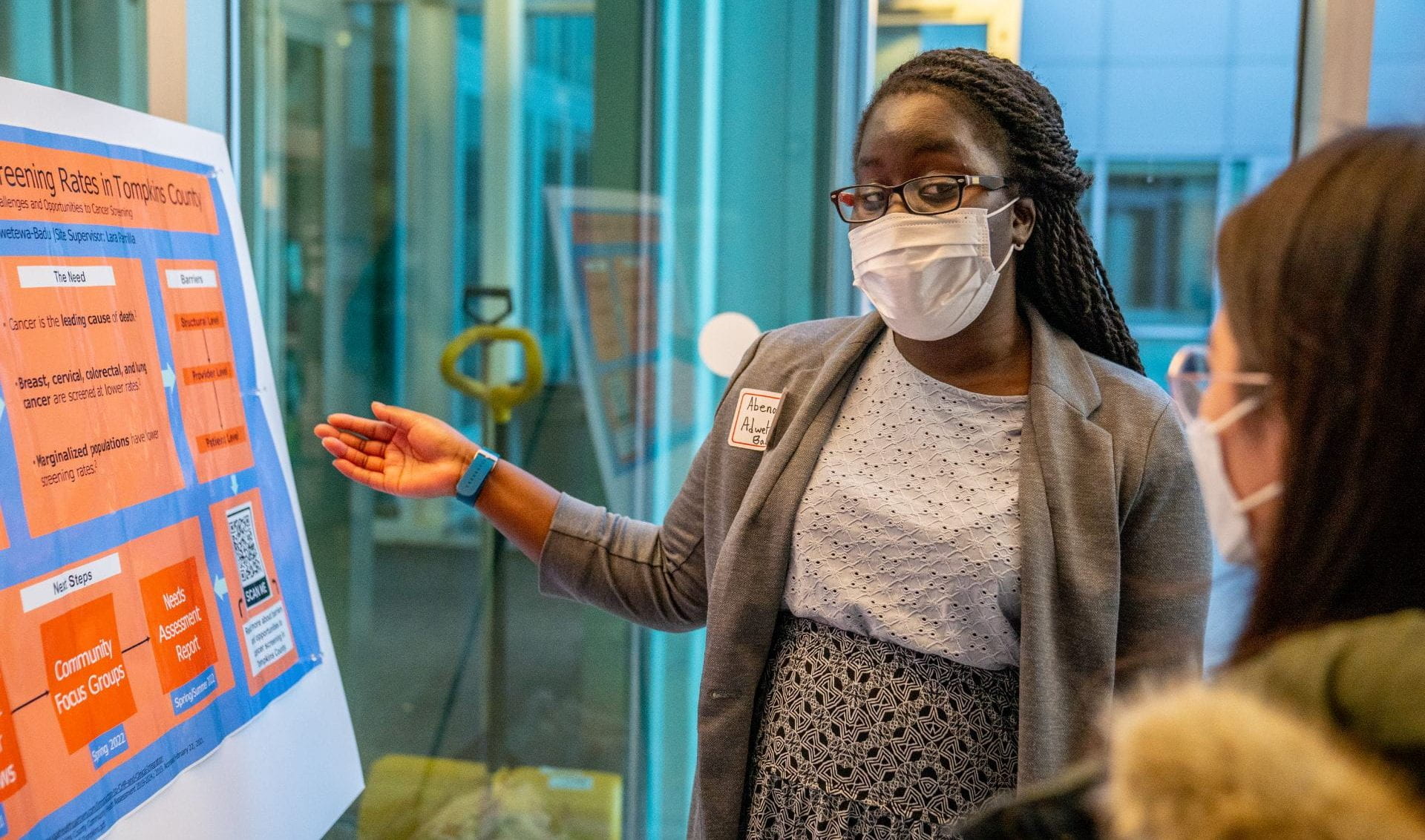The Applied Practice Experience
Overview
What is the Applied Practice Experience?
It’s like an internship.
The Applied Practice Experience (APEx) — designed in partnership with organizations across New York State, the United States, and around the world — is an opportunity for students to work with partner organizations and engage with a real-world public health project. Students apply knowledge and skills learned in the classroom, demonstrate competence, and contribute to public health, under the mentorship of a public health professional.
To complete the APEx, students spend at least 120 hours on applied practice, either with one major project over the summer, or with a few smaller projects across semesters or breaks. As part of the APEx, students develop deliverables for partners and present their work in a public poster symposium. These deliverables also become part of each student’s professional portfolio.
The APEx may be paid or unpaid, and can take many forms.
Students and partners working together
It’s a win-win.
Students gain valuable public health experience and help partners expand their capacity by producing tangible deliverables.
Examples of deliverables include:
- Outreach materials
- Stakeholder presentations
- Quantitative and qualitative data analyses
- Grant proposals and reports
- Community needs assessments
- Summary reports
- Data visualizations
- Literature reviews
- Handbooks and manuals
- Curricula and activities
- Policy briefs
- Logic models
- And more!
When does the Applied Practice Experience take place?
Usually in the summer, but not always.
The APEx usually takes place over the summer (6-8 weeks on-site work), between a student’s first and second years in the MPH Program. Some projects take place in the spring, fall, or across multiple semesters. Timing can be flexible, but please check with the applied practice coordinator, Audrey Baker at azb4@cornell.edu if your project timeline does not take place over the summer.
What do site supervisors do?
Plan, mentor, and offer feedback.
Site supervisors:
- Help define a project opportunity that supports their organization
- Collaborate with the student to develop a Project Work Plan including a project description, applied learning objectives, a timeline of activities, and two or more deliverables
- Mentor the student on site with their organization
- Complete brief mid-point and final evaluation surveys
- Approve the student’s final deliverables, along with descriptions of how they applied public health skills during the project
Examples of past Applied Practice Experiences
Here are just a few:
- Supporting development of public health emergency response plans and a triage manual with the Tompkins County Department of Health in Ithaca, New York
- Developing mobile farmers’ market and nutrition curriculum proposals with Cornell Cooperative Extension of Nassau County in New York State
- Collecting, analyzing, and communicating Hurricane Harvey surveillance data with the Texas Department of State Health Services in Austin, Texas
- Assessing food security and safety risks associated with food chains in Kenya and developing a research plan with the Smithsonian Global Health Program
Funding for the Applied Practice Experience
The APEx may be paid or unpaid.
They can require budgeting and planning, especially if a student plans to travel for the experience. Costs might include airfare, housing accommodations, or commuting costs. International students or projects may also require visa or immunization fees. While some APEx partners offer stipends, many do not. It is the student’s responsibility to research and secure necessary funding.
For Partners
Have an idea for an Applied Practice Experience for an MPH student?
If you have an idea for a new project, or could use another enthusiastic team member to support an existing project, consider hosting a Cornell MPH student. Our students are motivated to dedicate time, energy, and skills to support organizations and create useful deliverables.
Share your idea with us!
- Reach out to the applied practice coordinator, Audrey Baker at azb4@cornell.edu for more information
- Complete an Applied Project Opportunity Form
- Have an informational interview with a student


